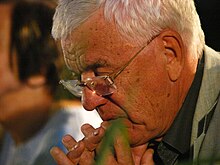Raimonds Pauls
Ojārs Raimonds Pauls ( Russian Раймонд Вольдемарович Паулс / Raimond Woldemarowitsch Pauls; born January 12, 1936 in Riga ) is a Soviet - Latvian composer .
life and work
After studying at the Latvian Academy of Music, Pauls worked as the conductor of the Riga stage orchestra from 1965. His fame was initially limited to his home republic. Among other things, he worked here with the singer Nora Bumbiere , who is very well known in Latvia . The song Listja scholtyje ( Yellow Leaves , 1975) became the first of his hits across the Eastern Bloc. Pauls then wrote the music for some films, which in part thanks to this fact became box office hits Dolgaja doroga w djunach ( A Long Dune Path ), Strely Robin Guda ( The Arrows of Robin Hood ). The musicals Sister Carry and Sherlock Holmes followed.
However, he rose to a mega-star in 1983 after singing the songs Gde ty ljubow? For pop diva Sofia Rotaru . ( Where are you, dear? ) Tanez na barabane ( dance on the drum ), Ossoby Drug ( special friend ), as well as the songs Million alych ros ( one million scarlet roses ), Maestro and Starinnyje chassy ( the ancient one ) for the singer Alla Pugatschowa Clock ) wrote. These songs had overwhelming success throughout the Soviet Union . A cult developed around the names Rotaru, Pugacheva and Pauls, which to this extent was still unknown in the country.
At the end of the 1980s, the two artists parted ways, Pauls began working with the singers Laima Vaikule and Valeri Leontjew . In 2002, his protégée Marija Naumova won the Eurovision Song Contest . From 2002 to 2010 he was involved in the jaunais vilnis events to promote musical talent.
politics
After 1988, Raimonds Pauls headed the Latvian State Committee for Culture and in 1991 he became the first Minister of Culture of independent Latvia. From 1993 he held the post of advisor to the President for Culture. In 1999 he even ran for the office of president. From 1998 to 2010 he was a member of the Latvian Parliament. From 1997 to 2000 he was chairman of the Jaunā partija (German: New Party), “without really becoming active in politics”.
Individual evidence
- ↑ http://zinas.nra.lv/latvija/19682-raimonds-pauls-aiziet-no-jauna-vilna.htm
- ↑ http://www.diena.lv/sabiedriba/politika/pauls-nav-parregistrejies-tp-noguris-no-politiskajam-intrigam-720809
- ^ Axel Reetz: The development of the party systems in the Baltic states. From the beginning of the multi-party system in 1988 to the third election . Surbir, Wittenbach / SG 2004, p. 116.
Web links
- Official website of Raimonds Pauls (Latvian, English)
| personal data | |
|---|---|
| SURNAME | Pauls, Raimonds |
| ALTERNATIVE NAMES | Pauls, Ojārs Raimonds (full name); Паулс, Раймонд Вольдемарович (Russian); Pauls, Raimond Woldemarowitsch |
| BRIEF DESCRIPTION | Soviet-Latvian composer |
| DATE OF BIRTH | January 12, 1936 |
| PLACE OF BIRTH | Riga , Latvia |
